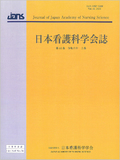Japanese
English
- 販売していません
- Abstract 文献概要
- 参考文献 Reference
要旨
目的:日常的に使用される一般的な範囲の異なる湯温で手浴を行い自律神経活動に及ぼす影響を明らかにすることを目的とする.
方法:女性ボランティア15名を対象とした.実験的に交感神経活動が優位の状態および副交感神経活動が優位な状態を誘発し,湯温39℃と42℃の2種類を設定し,4種類の実験を各3分間実施した.
結果:暗算負荷による交感神経賦活状態では交感神経指標は39℃が1.31(0.77〜1.70),42℃が2.09(1.17〜2.50)と42℃が39℃に比較して有意に高値であった.閉眼による副交感神経賦活状態では交感神経指標は39℃が0.13(0.01〜0.36),42℃が0.44(0.21〜0.66)と42℃が39℃に比較して有意に高値であった.
結論:39℃と比較した場合,42℃の手浴が交感神経系を亢進させる効果があることが示され,リラックスや覚醒などの目的に応じて手浴の湯温を選択することでより効果的なケアが可能であると考えられた.
Purpose: This study aimed to clarify the effects of hand baths at commonly used water temperatures on autonomic nervous activity in daily life.
Methods: The subjects were 15 healthy female volunteers. We experimentally induced states of predominant sympathetic nervous activity and predominant parasympathetic nervous activity, setting two hand bath temperatures at 39℃ and 42℃. We performed a total of four types of experiments, each lasting 3 minutes.
Results: During sympathetic nerve activation induced by mental arithmetic loading, the sympathetic activity index at 39℃ was 1.31(0.77-1.70), and at 42℃ it was significantly higher at 2.09(1.17-2.50). During parasympathetic nerve activation induced by eye closure, the sympathetic activity index at 39℃ was 0.13(0.01-0.36), and at 42℃ it was significantly higher at 0.44(0.21-0.66).
Conclusions: The study has revealed that a water temperature of 42℃ stimulates the sympathetic nervous system more effectively than a temperature of 39℃, both during sympathetic and parasympathetic nerve activation. Furthermore, the findings indicate that adjusting the water temperature based on the desired outcome, whether for relaxation or arousal, can lead to more effective care.
Copyright © 2024, Japan Academy of Nursing Science. All rights reserved.


